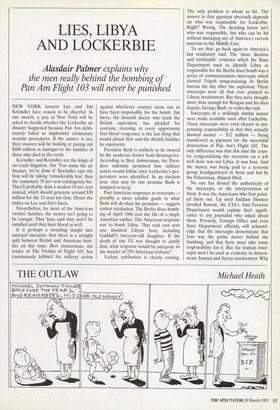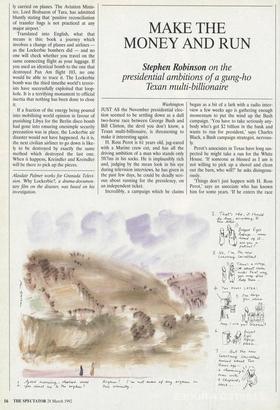LIES, LIBYA AND LOCKERBIE
Alasdair Palmer explains why
the men really behind the bombing of Pan Am Flight 103 will never be punished
NEW YORK lawyers Lee and Jim Kreindler have reason to be cheerful. In one month, a jury in New York will be .asked to decide whether the Lockerbie air disaster happened because Pan Am delib- erately failed to implement elementary security procedures. If the answer is yes, then insurers will be looking at paying out $400 million in damages to the families of those who died in the crash.
Kreindler and Kreindler are the kings of air crash litigation. Jim 'You name the air disaster, we've done it' Kreindler says the firm will be taking 'considerably less' than the customary 30 per cent contingency fee. They'll probably skim a modest 10 per cent instead, which should generate around $30 million for the 12-man law firm. Hence the smiles on Lee and Jim's faces.
Nevertheless, for most of the American victims' families, the money isn't going to be enough. They have said they won't be satisfied until they have blood as well.
It is perhaps a revealing insight into national character that there is a straight split between British and American fami- lies on this issue. Bert Ammerman, the leader of The Victims of Flight 103, has continuously lobbied for military action against whichever country turns out to have been responsible for the bomb. Jim Swire, the donnish doctor who leads the British equivalent, has pleaded for restraint, stressing at every opportunity that blood vengeance is the last thing that would please him and the British families he represents.
President Bush is unlikely to be swayed by the moderate doctor from Bromsgrove. According to Bert Ammerman, the Presi- dent solemnly promised him military action would follow once Lockerbie's per- petrators were identified. In an election year, that may be one promise Bush is tempted to keep.
Past American responses to terrorism — possibly a more reliable guide to what Bush will do than his promises — suggest violent retaliation. The Berlin disco bomb- ing of April 1986 cost the life of a single American soldier. The American response was to bomb Libya. That raid cost over one hundred Libyan lives, including Gaddafi's two-year-old daughter. If the death of one GI was thought to justify that, what response would be adequate to the murder of 250 American civilians?
Violent retribution is clearly coming. The only problem is whom to hit. The answer to that question obviously depends on who was responsible for Lockerbie. Right? Wrong. The deciding factor isn't who was responsible, but who can be hit without damaging any of America's current interests in the Middle East.
To see that, go back again.to America's last retaliatory raid. The 'clear, decisive and irrefutable' evidence which the State Department used to identify Libya as responsible for the Berlin disco bomb was a series of communications intercepts which showed Tripoli congratulating its Berlin bureau the day after the explosion. These intercepts were all that ever pointed to Libyan involvement. But they were thought more than enough for Reagan and his then deputy, George Bush, to order the raid.
Intercepts of a strikingly similar nature were made available soon after Lockerbie. These intercepts were even clearer in pin- pointing responsibility in that they actually showed money — $12 million — being transferred as payment for the successful destruction of Pan Am's Flight 103. The only difference was that this time the coun- try congratulating the terrorists on a job well done was not Libya. It was Iran. And the money was being paid to a terrorist group headquartered in Syria and led by the Palestinian, Ahmed Jibril.
No one has denied the authenticity of the intercepts, or the interpretation of them. It was the Americans who first point- ed them out. Up until Saddam Hussein invaded Kuwait, the CIA's Anti-Terrorist Department would explain their signifi- cance to any journalist who asked about them. Privately, Foreign Office and even State Department officials, will acknowl- edge that the intercepts demonstrate that Iran was the prime mover behind the bombing, and that Syria must take some responsibility for it. But the Iranian inter- cepts won't be used as evidence to demon- strate Iranian and Syrian involvement. Why
not? `National security. They would reveal too much about our eavesdropping capaci- ty,' officials from the CIA's anti-terrorist section and the Foreign Office's Security Co-ordination Committee told me.
For 'national security' read 'political convenience'. Syria and Iran are now our friends. They helped release the hostages and they helped defeat Saddam. No one wants to offend them, let alone drop bombs on them. In the Middle East, with Iraq crippled and the peace conference underway, Syria and Iran are the two major powers. There is everything to play for. And the United States and Britain intend to make sure the play goes their way.
So the world is not going to wake up one morning to discover that American jets have bombed Teheran or Damascus. Iran and Syria are not even going to suffer diplomatic sanctions. Instead, they will be sent arms and given trade credits. And the intercepts which, just a few years ago, would have been claimed as 'clear, decisive and irrefutable' evidence that Ali Akbar Mohteshemi, Iran's Interior Minister in 1988, commissioned Ahmed Jibril, head of the PFLP-GC, a Palestinian terrorist group then based in Damascus, Syria, to organise the bomb that killed 271 innocent people, will be suppressed.
Libya is an entirely different matter. Colonel Gaddafi has few friends and pre- cious little influence. The country is an ideal candidate for a bombing raid. It can't damage US interests, and it can't hit back. The only problem is how to pin the blame for Lockerbie onto Libya.
Which is not to say that Libyans had nothing at all to do with the explosion. They almost certainly did. The two Libyans indicted for the bombing last November — Abdel Baset Mohmed Ali al-Megrahi, and Al-amin Khalifa Fhimah — are very likely the men who physically placed the bomb in the international bag- gage system, with a stolen baggage tag which ensured it would be transferred to Pan Am Flight 103. But in all the talk about the need for 'justice' and the impor- tance of punishing them for what they did, both the American and British govern- ments are conveniently forgetting who ordered them to do it. In a normal murder trial, the prosecution would hold the men who ordered and paid for a killing to be as guilty as the men who actually pulled the trigger. And the Iranians were quite frank about their desire to revenge the shooting down of the Iranian air bus by the USS Vincennes in the five months before Lockerbie. Ayatollah Khomeini promised that it would be avenged in the 'blood- splattered skies'.
Yet America, with Britain in tow, seems about to compensate for its diplomatic inability to touch Syria and Iran by ham- mering Libya. Many of the diplomatic moves which preceded the 1986 raid on Gaddafi's bunker were lined up last week: an air embargo, an arms embargo, togeth- er with a warning from the State Depart- ment and the Foreign Office to all Americans and Britons to leave as fast as possible. Gaddafi is clearly a worried man. In an attempt to placate the United States, he has agreed to hand over the two sus- pects to the Arab League, who will proba- bly hand them to the West. Gaddafi's hope is that this will be enough to satisfy George Bush. But if the President persists in identi- fying Gaddafi as solely responsible for the deaths of 250 American civilians, it is not clear how it can be.
If America does decide it needs to exact blood vengeance from Libya as well as the conviction of al-Megrahi and Fhimah, let us hope someone tightens up air security afterwards. For as things stand, Lockerbie could happen again, tomorrow, with revenge-hungry Libyans able to crawl through exactly the same security loophole that led to the destruction of Flight 103. Kreindler and Kreindler are going to win in New York because nine months before Lockerbie, Pan Am discontinued the one security procedure which almost certainly would have prevented the disaster: the matching of bags to passengers. Dropping the precaution broke the rules and proba- bly saved Pan Am a few thousand dollars. It also ensured that when the unaccompa- nied bag containing the bomb was trans- ferred onto Pan Am Flight 103, no one bothered to take it off the plane. The stag- gering fact is that almost every airline based in Europe followed, and still follows, Pan Am's example. Despite an Internation- al Civil Aviation Organisation rule which forbids it, unaccompanied bags are routine- ly carried on planes. The Aviation Minis- ter, Lord Brabazon of Tara, has admitted bluntly stating that 'positive reconciliation of transfer bags is not practiced at any major airport.'
Translated into English, what that means is this: book a journey which involves a change of planes and airlines — as the Lockerbie bombers did — and no one will check whether you travel on the same connecting flight as your luggage. If you used an identical bomb to the one that destroyed Pan Am flight 103, no one would be able to trace it. The Lockerbie bomb was the third timethe world's terror- ists have successfully exploited that loop- hole. It is a terrifying monument to official inertia that nothing has been done to close it.
If a fraction of the energy being poured into mobilising world opinion in favour of punishing Libya for the Berlin disco bomb had gone into ensuring onesimple security precaution was in place, the Lockerbie air disaster would not have happened. As it is, the next civilian airliner to go down is like- ly to be destroyed by exactly the same method which destroyed the last one. When it happens, Kreindler and Kreindler will be there to pick up the pieces.
Alasdair Palmer works for Granada Televi- sion. Why Lockerbie?, a drama-documen- tary film on the disaster, was based on his investigation.




























































 Previous page
Previous page